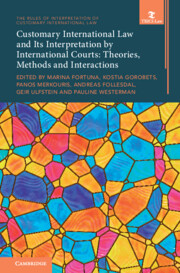Customary International Law and Its Interpretation by International Courts
It is notorious that international courts and tribunals have greatly contributed to the development of customary international law (CIL) by, for instance, articulating the constituent elements of custom and clarifying the conditions required for its modification. This volume demonstrates that they have also been actively engaged in the interpretation of CIL. In elucidating CIL interpretation before and by international courts and tribunals, the volume chooses three focal points: theory, method and normative interactions. Viewing CIL and its interpretation from these vantage points leads to a more complete picture of the role and function of CIL interpretation in international courts. The volume encourages readers to question orthodox theories on CIL and its interpretation, to look anew at what has long been labelled as mere identification of custom, and to take a systemic approach to CIL, which, even in the process of interpretation, remains unwaveringly connected to treaties and general principles of law.
This title is also available as Open Access on Cambridge Core.
Marina Fortuna is Assistant Professor at the University of Groningen and member of the TRICI-Law project team. Her research focuses primarily on the practice of international courts, which she examines from the perspective of various topics in general international law.
Kostia Gorobets is Assistant Professor of International Law at the University of Groningen. He specialises in analytical jurisprudence and philosophy of international law, as well as in their interplay.
Panos Merkouris is Professor of International Law at the University of Groningen. He is Principal Investigator of the TRICI-Law project (ERC Grant Agreement No. 759728). Professor Merkouris has written extensively on the law of treaties, sources and interpretation, most recently authoring Interpretation of Customary International Law: Of Methods and Limits (2024).
Andreas Follesdal is Professor of Political Philosophy at the Faculty of Law, University of Oslo. He co-directed PluriCourts and was Principal Investigator of ERC Advanced Grant MultiRights 2011–16. He publishes in the field of political philosophy, mainly on international political and legal theory, globalisation/Europeanisation and human rights. He is Fellow at Wissenschaftskolleg zu Berlin 2023–24.
Geir Ulfstein is Professor Emeritus of International Law at the University of Oslo, where he also co-directed PluriCourts. He is President of the Norwegian Branch of the International Law Association (ILA) and winner of the University of Oslo Research Award 2021 (with Andreas Follesdal). He has published in various areas of international law, including the law of the sea, international environmental law, international human rights, international institutional law and international courts.
Pauline Westerman is Professor of Philosophy of Law at the University of Groningen, a member of staff at the Academy for Legislation in The Hague and a member of the Royal Dutch Academy of Sciences. Her research focuses on the making of law, the formation of soft law and the emergence and development of international law.

